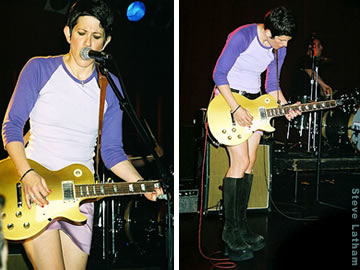
A Conversation with Jen Trynin
Puremusic: How did the book tour go?
Jen Trynin: It was a lot of fun. Kind of short, which makes it that much more fun in a way. Lots of people came out. Some old friends, and people I worked with back in the day, who I hadn't seen in eight or ten years.
PM: Was writing this book a cathartic experience for you?
JT: I think that it ended up that it was. I stopped doing music in '98, and I started writing about my experiences a little bit the year after, just because I had all these really strong memories going through my head, day after day. It was kind of bugging me. I'd been a writing major in college, and had done a lot of writing in my life. Probably more writing than I did music, up until I decided to pursue music seriously. When I stopped doing music, I didn't create anything for a year, because I just couldn't stand the thought of creating anything.
But then when I started doing stuff, it ended up being prose writing. For about two years, I wrote when I felt like it. Then I started taking these writing workshops, and the teachers encouraged me to make my story into a book. So I did. It was very stream of consciousness at the beginning, then it ended up being quite chronological. Boringly so, in a way. [laughs]
PM: The end of the book skips from your exit from the business to the present. When you first walked away, what was that like for you?
JT: I was so sick of the whole thing. I had been set up to supposedly have all this success, and it made absolutely no sense to me. It still doesn't, to tell you the truth. It's like, okay, so I wasn't the biggest star in the world, but I had no idea how it ended up that I had nothing. I didn't know how you went from having everything to nothing. So I felt like I had nowhere to go.
As I say in the book at the very end, I thought trying to scramble around and convince another major label to sign me would be worthless and humiliating. I didn't think any indie would have anything to do with me because I was who I was at the time. I'm sure they all just thought I was the biggest sell-out in the world. I could see why they'd think that, so I thought, "What do I do? Do I want to go back to just playing in my room?"

I'd gone through it all. I'd been doing music at that point since I was ten or eleven years old, and I really felt in a lot of ways that I had done as much as I could do. I wasn't sure what else to do after that. So I just stopped. It wasn't hard to stop. But it was very hard to figure out what else to do with my life. It was very empty.
PM: Did you go into a different line of work?
JT: I'd saved a lot of money from what I'd made in the music thing. Even though I didn't sell many records, I had advances that I didn't spend all the money of.
PM: Good for you.
JT: [laughs] It's the upside of being a real pessimist. I figured something bad was going to happen, and I might as well have a little bit of money. So that was good, because I didn't have to go find a job right away. I enrolled in Harvard's adult education program, and I did that full-time for a year. I took Intro To Economics, Intro To Philosophy, Calculus--all this stuff I hadn't taken in college. I really enjoyed it. That's how I kind of hid. I probably would've moved out of Boston, but my boyfriend at the time--who's now my husband [producer Mike Deneen]--owns a recording studio here, so he couldn't really move. So it was either break up with him and move, or disappear here.
PM: After the way it ended with the major label deal, coming back to Boston must've been hard. When you'd run into old friends, did you feel the need to explain what happened and justify yourself?
JT: It was awful. I just stopped going out for like two years. [laughs] That's another reason I wrote the book, because people were like, "What happened? Why did you quit?" I couldn't answer them, you know? So I wrote the book. continue
print (pdf) listen to clips puremusic home